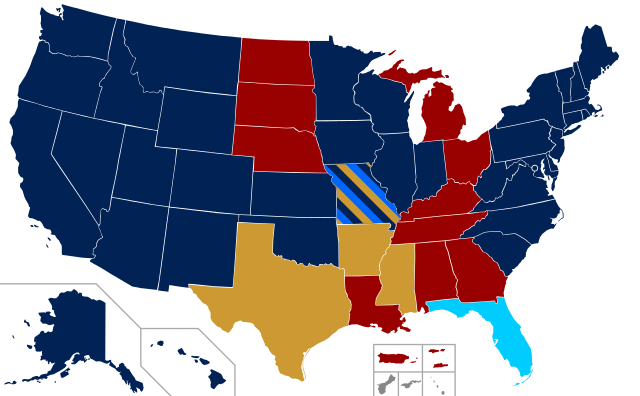Catching Up With the Same-Sex Marriage Circuit
Update (June 29, 2015): In its June 26 ruling in the case of Obergefell v. Hodges, the Supreme Court has finally moved the issue of same-sex marriage beyond the immediate reach of the democratic process. The Court found that marriage between two people of the same sex is a fundamental right which is protected by the Fourteenth Amendment. Legislatures and voters of the various states no longer even have the possibility of infringing that right.
The United States of America was founded as a markedly less democratic nation than it exists today. The designers of the various state governments preferred a system of representative legislators chosen by a small, wealthy subset of the male population. But the allure of democracy is strong, and the 18th and 19th centuries saw successful movements first for universal suffrage and then for the initiative and referendum.
The first decade of the 21st century gave a small sample of how such direct democracy can go wrong, as the people in dozens of states, driven by religious superstition and cultural conservatism, used the referendum to enact constitutional bans on same-sex marriage. It wasn’t until 2012 that such an attempt to democratically control other people’s families failed when Minnesota’s Amendment 1 was rejected by 51.19% of voters. Because of the silence of the Supreme Court, it has been left to federal district and appellate courts to override the bigoted voice of the American people in a piecemeal fashion.
In April I wrote an article about Kitchen v. Herbert, the case challenging Utah’s ban on same-sex marriage: “Loving v. Utah and Mormonism’s Embarrassing Saga of Marital Policy”. At the time, the Tenth Circuit Court of Appeals had not yet made a ruling on the case. But in June the appellate court affirmed the district court’s ruling “that Amendment 3 and similar statutory enactments do not withstand constitutional scrutiny.” The mandate for Utah to recognize same-sex marriages was stayed pending Supreme Court review.
But on October 6, the Supreme Court denied without comment the petition to review, leaving the Tenth Circuit court’s mandate in effect which is binding not only in Utah but in Colorado, Kansas, New Mexico, Oklahoma, and Wyoming. At this time, Kansas still has a constitutional ban on same-sex marriage, but it should not survive challenge given the circuit court’s ruling.
The Supreme Court also refused to decide on Bostic v. Schaefer from the Fourth Circuit Court of Appeals and on Baskin v. Bogan from the Seventh Circuit, leaving in place the district courts' rulings against the bans on same-sex marriage providing decisions and precedents binding in Virginia, Maryland, North Carolina, South Carolina, and West Virginia (Fourth Circuit); as well as Illinois, Indiana, and Wisconsin (Seventh Circuit).
However, on November 6, 2014, the Sixth Circuit Court of Appeals in DeBoer v. Snyder broke the pattern and reversed the decisions of district courts in Ohio, Michigan, Kentucky, and Tennessee which had ruled same-sex marriage bans in those states to be unconstitutional. In writing the majority opinion [PDF], Judge Sutton appealed to democracy, putting faith in the people’s ability to undo the marriage bans themselves without the court’s “impropriety of tinkering with the democratic process”:
“When the courts do not let the people resolve new social issues like this one, they perpetuate the idea that the heroes in these change events are judges and lawyers. Better in this instance, we think, to allow change through the customary political processes, in which the people, gay and straight alike, become the heroes of their own stories by meeting each other not as adversaries in a court system but as fellow citizens seeking to resolve a new social issue in a fair-minded way.”
DeBoer v. Snyder
So with federal appellate courts disagreeing with each other, clarification from the Supreme Court is still wanted.
Embedded below is Wikipedia’s color-coded map displaying the legal standing of same-sex marriage in the various states prior to the Obergefell v. Hodges decision. Click the image to view the up-to-date version maintained on Wikipedia.
